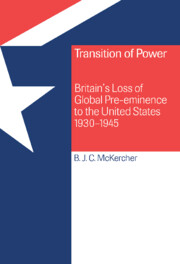Book contents
- Frontmatter
- Contents
- Acknowledgments
- List of abbreviations
- Prologue: Power and purpose in Anglo-American relations, 1919–1929
- 1 The end of Anglo-American naval rivalry, 1929–1930
- 2 The undermining of war debts and reparations, 1929–1932
- 3 Disarmament and security in Europe and the Far East, 1930–1932
- 4 The unravelling of co-operation, 1932–1933
- 5 Moving away from the United States, 1933–1934
- 6 Britain, the United States, and the global balance of power, 1934–1935
- 7 From Abyssinia to Brussels via London, Madrid, and Peking, 1935–1937
- 8 Appeasement, deterrence, and Anglo-American relations, 1938–1939
- 9 Belligerent Britain and the neutral United States, 1939–1941
- Epilogue: ‘A new order of things’, 1941–1945
- Select Bibliography
- Index
4 - The unravelling of co-operation, 1932–1933
Published online by Cambridge University Press: 15 July 2009
- Frontmatter
- Contents
- Acknowledgments
- List of abbreviations
- Prologue: Power and purpose in Anglo-American relations, 1919–1929
- 1 The end of Anglo-American naval rivalry, 1929–1930
- 2 The undermining of war debts and reparations, 1929–1932
- 3 Disarmament and security in Europe and the Far East, 1930–1932
- 4 The unravelling of co-operation, 1932–1933
- 5 Moving away from the United States, 1933–1934
- 6 Britain, the United States, and the global balance of power, 1934–1935
- 7 From Abyssinia to Brussels via London, Madrid, and Peking, 1935–1937
- 8 Appeasement, deterrence, and Anglo-American relations, 1938–1939
- 9 Belligerent Britain and the neutral United States, 1939–1941
- Epilogue: ‘A new order of things’, 1941–1945
- Select Bibliography
- Index
Summary
I am trying to avoid a situation which will mean that the United States will go back to the relations they had with us before 1929, when in spite of the Irish Settlement, opposition to us was regarded as very certain proof of patriotism to the United States.
MacDonald, June 1932Between early 1932 and early 1934, the international order created at the Paris peace conference and modified by the Washington and Locarno treaties and the war debt and reparations settlements came under sustained assault. British foreign policy had to ensure that Britain's economic, political, and strategic interests tied to these arrangements were safeguarded. Generally speaking, since 1921, that policy had been fashioned by finding grounds to co-operate with the major Powers: France, Italy, and Germany in Europe via the League, Locarno, and the war debt and reparations agreements; Japan in the Far East through the three Washington treaties; and, because of its interest in naval affairs and economic diplomacy, the United States by resolving the cruiser question and making the Dawes and Young settlements work. Some division had developed in the foreign-policy-making elite between those like Vansittart, Dalton, and Tyrrell who promoted ‘world leadership’ policies, whether they focused more on France or more on Germany, and ‘atlanticists’ like MacDonald. As evidenced by Henderson, these ideas were not mutually exclusive, and this produced a balanced foreign policy in pursuit of the global balance of power. But as the constellation of international power began changing after 1932, so did the equilibrium between the two main wings of the British elite. The ‘world leaders’ came to dominate policy-making.
- Type
- Chapter
- Information
- Transition of PowerBritain's Loss of Global Pre-eminence to the United States, 1930–1945, pp. 126 - 156Publisher: Cambridge University PressPrint publication year: 1999

